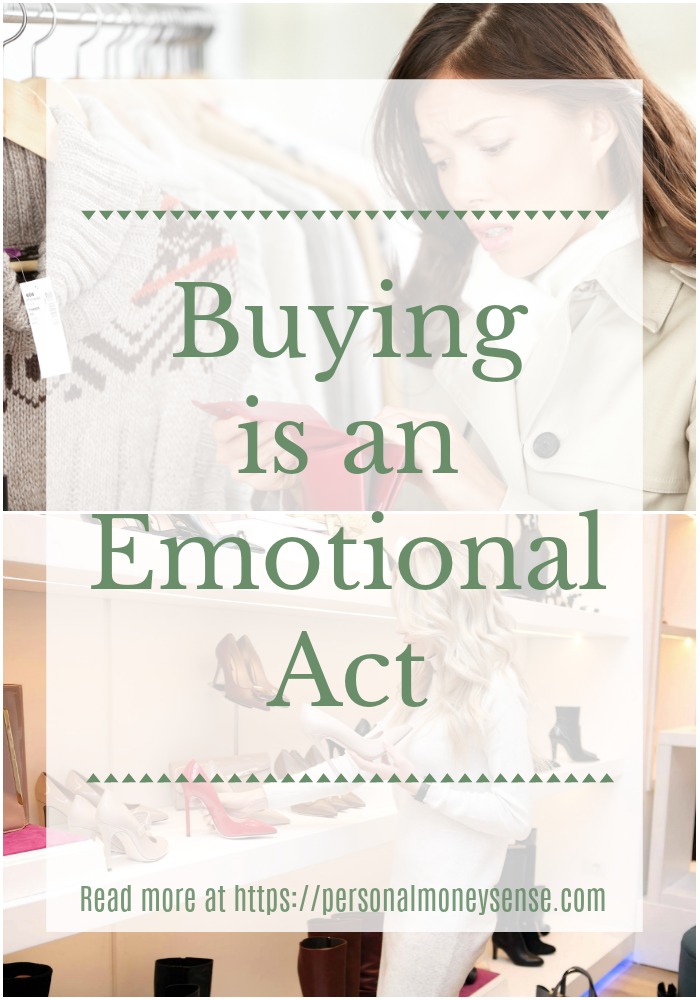Zig Ziglar had a statement about buying that succinctly describes how people are manipulated into buying things they do not want or need. Ziglar said,
People don’t buy for logical reasons. They buy for emotional reasons. -Zig Ziglar
He brilliantly summed up the bulk of the advertising market with that simple statement. People tend to buy out of emotion, not logic.
 Buying Is An Emotional Act
Buying Is An Emotional Act
It’s About The Feelings
Sure, there are times that we buy out of need. But at the root of that, it even tends to be emotional. For example, let’s say you need milk. While the need for milk is the reason for a purchase, you will buy the brand that makes you feel comfortable.
Sometimes that is the lowest cost brand, sometimes that is a familiar brand. But a feeling is the determining factor of the specific purchase.
Beyond purchasing for need, we have the act of purchasing for a want. Now, this is where we can get into trouble, and this is also the area in which marketing will try to drive you to their goods and services.
After all, in this frame of mind, we are looking for an emotional response from the act of purchasing.
Buying Can Be An Escape
For example, a purchase can serve as an…
- Escape from our everyday lives (books, videos, music).
- Addition to our lives for something that is perceived to be missing (tools, gadgets, self improvement).
- Validation that we are somebody (cars, houses, clothing, furnishings).
- Confirmation that we are a good person (gifts).
There are others, but you get the idea.
Advertisers will sell to you not based on content, or even the item itself, but rather on the feeling that you will get by making the purchase. That somehow this emotion will transform you from the inside out.
You want to be hip, buy our jeans.
Want to be cool, buy our shades.
You want to be of substance, buy a house in our neighborhood.
Maybe you want to be green, buy our hybrid.
You Want to Fit in, Buy Our Product
That is probably one of the biggest tricks that advertisers use in order to sell otherwise intelligent people on bad items, the claim that if you do not buy it you will not fit in, you will not be worthy.
In the older days, a traveling Encyclopedia salesman would tell you about how neighbors had made the purchase, alluding to the thought that you, or perhaps your children, will not measure up if you fail to make the purchase.
Today that same sentiment is bombarded at the consumer many times an hour.
And how does Joe Consumer respond? He buys. He buys when he cannot afford it, putting the purchases on credit cards. The sad part is that this very action, of buying to make himself feel better about his own life, has the reciprocal effect. Joe consumer ends up trashing his own finances, and his grip on his capabilities, by making the unwarranted purchases.
Self-Defeating Actions
Sadly, the very thing that Joe wants to improve ends up being destroyed by following the pitches. The emotional Gee Whiz that is promised simply does not happen from a manufactured product. It has to be self-created over time.
Don’t get me wrong, not all advertising is bad. Sometimes it is there to educate, and I will be the first one to stand up and talk about the importance of a quality book.
I have bought many books from an advertisement. And yes, there was an emotional process going on at the time. The desire to improve me. Sometimes advertising works to inform, and again it can be a good thing if properly moderated.
But that is perhaps the most important skill that a consumer has in today’s world. And one that, properly used, is a tremendous aid in achieving and maintaining personal wealth.
That skill, self-moderation, lets us see past the ads promising the emotional Gee Whiz, and can help us to evaluate the information streaming at us from all sides and properly file it under the junk or worthwhile bin. Even hobbies can be managed without overspending.
It is not an easy task to wade through the sea of consumer marketing, and there will be times that we stumble.
However, if we use those times to learn from our mistakes it can help us avoid bigger mistakes in the future. Educating us about the process. By making informed buying habits based on logical and solid feelings, instead of emotional spending, we can find ourselves on a solid path to personal wealth.



